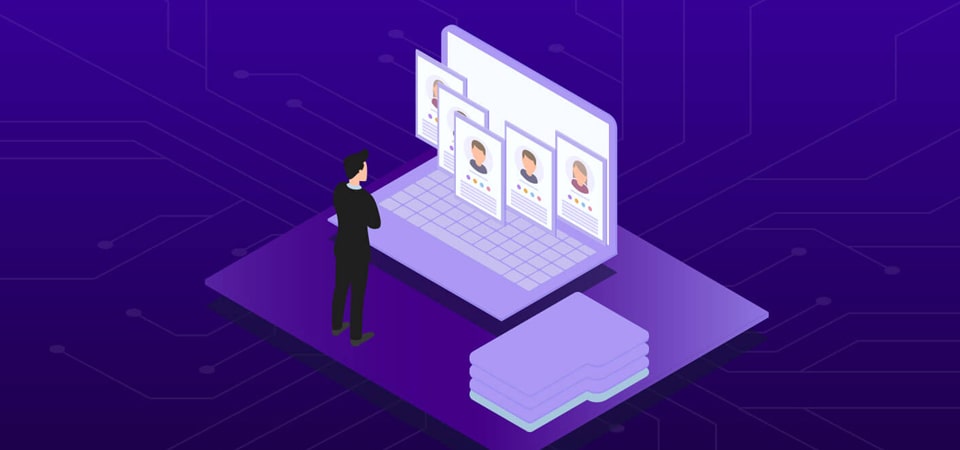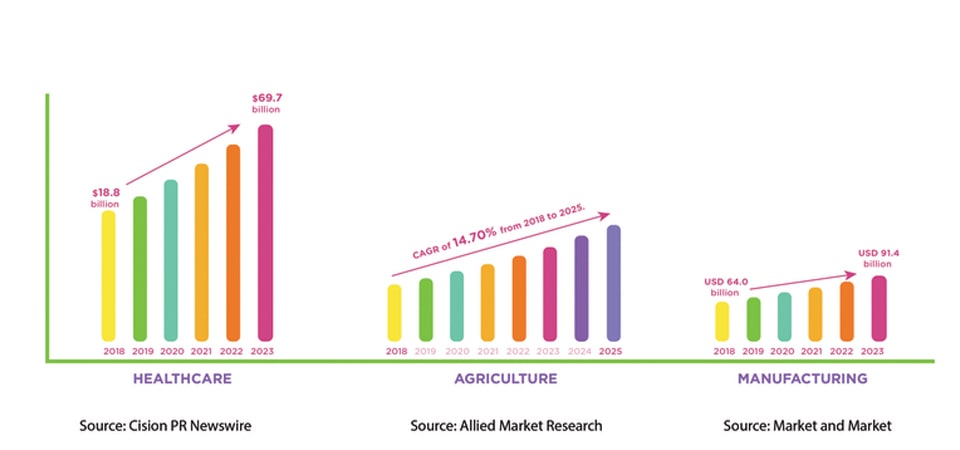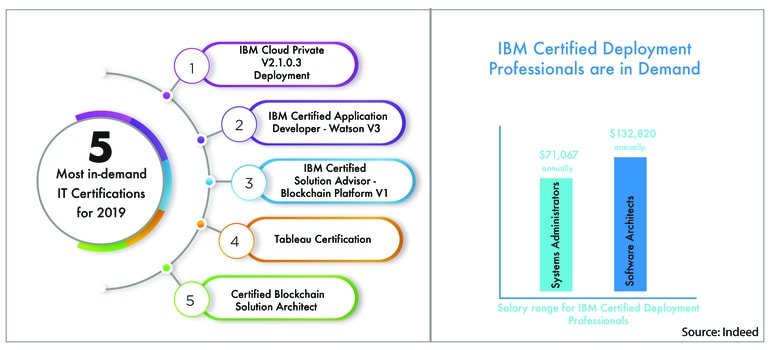
How Tableau helps in Analytics?
Tableau -Desktop

5 ways your Business can leverage Big Data
Analytics

Machine Learning - A Trending Tech Skill in 2020
Analytics

A Beginner’s Guide to Cloud Computing
Cloud

A Sneak-Peek to Learning and Development Trends 2020
Analytics

Big Data Analytics as a Career route
Azure Cloud

How can Certification jumpstart your Career?
Certification

Why Skill Training is Imperative for Fresh Graduates?
Certification
Previous Post

A Sneak-Peek to Learning and Development Trends 2020
Looking back at 2019, it was a year of incredible technological breakthrough with AI Machine Learning being in the limelight. Gaining momentum dramatically, innovation has achieved a significant stature among the youth worldwide, where they are found to be experimenting with cutting-edge technologies and coming up with utterly innovative start-up ideas. India being the third-largest startup ecosystem is now home to over 8,900 tech-startups with 1,300 startups added in 2019. In this context, it is good to see that the growth of technologies has been ushering paradigm shift to the nation’s economic state as well and making room for the need of learning and development among the professionals across varied designations. Getting Technology Adaptable Becoming acquainted with emerging technologies takes time and adequate training for professionals working in the IT sector. Business leaders across the globe are concentrating on getting trained so that they can make the most out of the technological advancements and meet their business goals. Leading corporates are also making initiatives to organize training and development programs for their employees, aiming to enhance organizational performance. While there has been an impressive rise in the corporate training front in 2019, it is forecasted that 2020 will also be a year of great success in terms of professionals enrolling in top IT courses and focusing on continuous learning. Learning and Development Trends 2020 With the steady shift to a knowledge-based economy and increasing demand for a vibrant and future-ready workforce, the effectiveness of training and development is being recognized more than ever before. Owing to this, companies across all the industries are taking relevant steps in embracing learning and development training — enabling their existing employees to bridge the gap between the industry expectations and their skills. Let’s have a look at few learning and development trends of 2020 we have found after rigorously researching and understanding the L&D functioning of different leading organizations. Focusing on Agility: In a tight labor market, where recruiting an employee who is equally skilled and honest to the organization is not easy to find. In this scenario, companies are taking the plunge to retain their old employees by encouraging them to remain agile and be a lifelong learner. The L&D teams of companies are increasingly stressing upon motivating the employees to take up professional certifications and become an asset to the company. “Agility is the ability to adapt and respond to change … agile organizations view change as an opportunity, not a threat.” –Jim Highsmith, American software engineer Reskilling the Talent: Considering the inculcation of new technologies in the operations of many industries, companies are left with no choice other than employing the technologies to bring in better ROI. Also, while the outcome of layoffs is quite adverse on the workforce, there remains a huge loss for the organizations as well- in multiple aspects. Employing new talent which can be a troublesome job for the human resource team of the company, it takes lesser hassle to reskill the existing talent. Employee skill development is being included as a priority in the L&D plans of top-notch companies now. From reskilling the talents by enrolling them into artificial intelligence courses to making them learn tableau and data science, companies are leaving no stone unturned to make sure their employees are equipped with new-age skills. Boosting organizational cultures: Undeniably, one of the top most features which insists the employee to stay in the company is its organizational cultures. Taking this into consideration, companies are deciding upon taking the benefit of learning and development programs to heighten a culture within the organizations’ that are aligned appropriately to the immediate as well as future goals. Companies’ business strategy synced with the overall organizational culture puts a substantial impact on the employees’ capabilities and business strategic objectives. Technologies to look forward From Artificial intelligence to Cloud Computing, technological innovations is already disrupting business in every industry, steering innumerable opportunities. However, there has been also a lot of debate and discussion regarding the technologies replacing several jobs across all the industries. To justify that, it is been estimated that by 2020, 46% of the workforce will be absorbed in entirely new jobs that do not exist today or will be deployed in jobs that have drastically revamped skill sets. Contradictory to this, according to Gartner AI will create 2.3 Million Jobs in 2020, while eradicating only 1.8 Million jobs, raising the spirits and hope of employers. As they say, there are always two sides of a coin and each one has its one advantage and disadvantages. In the case of work and job ecosystem as well, the emergence of new technologies which stand as a job threat for many professionals, on the other hand for professionals who keep updated with the skills that are aligned with the technologies, attain a competitive edge in the job market. Automation and digitization possess a lasting effect on the life of IT professionals. Right skills are required to keep thriving in the industry, which can save several jobs, ignoring them can ironically put a full-stop in the paths of career goals. The current situation when mass layoffs are happening worldwide, with top companies showing thousands of employees the exit door, a number of organizations and professionals are considering taking IT Certifications. They are now relatively more conscious and aware of the purpose of training and development compared to days when growth used to happen in the job without having any skills and expertise in trending software and technologies. Towards a Eureka Moment The beginning of a new decade sustains great hopes for the IT professionals who indulge more into L&D activities and develop their potentialities to make data-driven decisions and perform as per the need of the hour, meeting the dynamic needs of the industry. L&D teams are expected to come together to generate productive results based on the skill requirements of each employee. It has to be kept in mind, that L&D can only be beneficial if it is customized as per individual employee’s career goals and aspirations. Companies with rigid and one-size-fits-all L&D strategies can never attain success with those who have set flexible and quality L&D plans.

A Beginner’s Guide to Cloud Computing
Remember the days when we used to store data in floppy disks? The present day is different-with the advent of cloud, storage and access of data is no more an arduous task. Whether it is big corporations or individuals, everyone is leveraging the power of Cloud. The impact of Cloud Computing is so high that, Forbes in its Cloud Computing Forecasts projected it will witness an increase to $162B in 2020 from $67B in 2015attaining a compound annual growth rate (CAGR) of 19%. What is Cloud Computing? It was not very long ago when people had to maintain a pile of physical documents which if lost or misplaced could cost a great deal. Cloud Computing has transformed how the internet was used completely-enabling storing data in a centralized location which can be accessed from computer and mobile device anytime anywhere. Whether it is pictures, important data, now with the access of cloud, sharing files has never been so easy. To sum up, Cloud literally acts as a virtual drive or maybe more than that. Cloud Computing Service Models Cloud services are based and categorized on three service models, namely- Infrastructure as a Service (IaaS), Platform as a Service (PaaS) and Software as a Service (SaaS). IaaS in cloud computing: The first layer of Cloud, IaaS or Infrastructure as a Service involves delivering cloud computing infrastructure where third party providers such as Amazon Web Services, Microsoft Azure or Google, hosts virtualized computing resources over the Internet. Here customers can pay as per their use which enormously eliminates the expenditure goes on deploying in-house hardware and software. PaaS in cloud computing: Platform as a service (PaaS)- the second cloud layer is a cloud computing model that enables delivering applications over the internet where a developer can easily create, run, test and manage the applications over cloud. In a PaaS model, a cloud provider can accommodate the software and hardware on its own infrastructure without having to worry about consuming IT infrastructure activities such as provisioning servers, backup, and storage. Few PaaS examples are Microsoft Azure, Google Apps Engine and AWS Elastic Beanstalk. SaaS in cloud computing: SaaS or Software as a service is the third layer, which is also popularly known as ‘on-demand software’, it is a software distribution model where applications can be hosted centrally on the cloud server and can be accessed directly without downloading or installing. Customer Relationship Management, Human Resource Solutions, Billing and Invoice System are some of the examples of SaaS applications. Deployment Models in Cloud Computing Private Cloud: Provides its services exclusively to a single enterprise or institution. In Private Cloud model the cloud infrastructure can be tracked only by the cloud provider or the user. Public Cloud: In the Public Cloud model, the services and infrastructure remain open to use for the general public. While the users have no control over the location of the infrastructure, they can access the services over a public network such as the internet. Hybrid Cloud: This Cloud model is basically the amalgamation of both Public Cloud and Private Cloud infrastructure where the particular enterprise or institution using it can benefit in the aspect of attaining scalability, flexibility, and security. Top Cloud Providers The popularity of Cloud is not only among businesses but also general users that stimulated number of companies to provide cloud services in the recent years. Today there are numerous cloud providers; however, there are handful of them who are leading in the cloud market. Google Cloud Platform: One of the most trusted and used Cloud Services, Google Cloud Platform offers public cloud computing services that ensure effective solutions for storage, analytics, Big Data, Machine Learning, and application development needs. Comprehending the growing popularity of GCP, there is more demand for professionals who will be able to work in a cloud-first work ecosystem. If you are considering a career in GCP, you can get certified and start an outstanding career. IBM Cloud Services: IBM’s Cloud Services enables developing, managing and running applications where mobile and web developers can very conveniently fabricate existing services from IBM or third-party providers. IBM cloud includes IaaS, PaaS, SaaS offering through all three delivery models of cloud- public, private and hybrid cloud. To earn a flourishing career in IBM Cloud, one has to enroll in quality IBM Training and obtain Certification which will validate their skills and knowledge. Amazon Web Services: Commenced providing its services in 2006, Amazon Web Services (AWS)stands out in the cloud industry by offering highly scalable, low-cost infrastructure and a reliable platform that empowers a myriad of businesses across 190 countries worldwide. Microsoft Azure: Boasts of matchless hybrid cloud capabilities along with secure and reliable service, Microsoft Azure provides software as a service and platform as a service. It equips the flexibility to assemble, manage and deploy applications on a globalized network. As per reports, MS Azure is being utilized by over 57% of Fortune 500 companies and prides on receiving official accreditation from the UK government. Aspire to land-up a great Cloud Computing Career? Take up a Certification in Microsoft Azure now and see your career booming. Why take Cloud Computing Certification? Not one, we shall give you six valid reasons for why you need to consider a career in Cloud Computing and earn a Certification. Also Read: How can Certification jumpstart your Career? Indeed’s search revealed that there are around 25,000 unfilled positions in the U.S. that are relevant to AWS alone. According to the predictions by International Data Corporation IDC that the spending on public cloud services and infrastructure is projected to exceed $277 billion by 2021 in an annual growth rate (CAGR) of 21.9 percent. There is a rise of 33% in employers expressing interest in cloud computing skills. By 2022, the overall development in IT spending on cloud-based offerings will be faster compared to the traditional (non-cloud) IT offerings- that will make cloud computing count as one of the most disruptive forces in the IT landscape. For Cloud Engineers in India, the average salary as of 2019 is INR 12, 01,527 according to Glassdoor. There are several dignified positions open for professionals with cloud computing skills, ranging from Cloud engineer to Software architect and Full stack developer to Development operations engineer, to name a few. Whether you are craving to get an entry to the cloud computing domain or are in search for enhancing your cloud computing career, which is counted as one of the most demandable IT courses, get yourself enrolled today, because its worth your time and investment!

Machine Learning - A Trending Tech Skill in 2020
While human being is the creator of technology, today almost no one can imagine their life without technology. That’s how profoundly technology is controlling its creator now. Mankind is literally at the cusp of rapid technological advancement. Around 73% of all cubicle-related jobs will be automated by 2030 which is equivalent to over 20 million jobs. (infographic) On the brighter side, this is also true that only humans hold the power of thinking and creating. Keeping pace with the technological advancements and getting versed in trending technology shall unequivocally let the working class stay valuable in the global technology job market. Tech enthusiasts today, to confront the changing technology ecosystem are increasingly showing interest in taking up top IT Courses and get trained in top technical skills. And when we talk about tech skills, mentioning Machine learning certainly becomes imperative. Also Read: Why Skill Training is Imperative for Fresh Graduates? What is Machine Learning? Google the meaning of Machine Learning, and you will end up finding countless definitions in technical language. In layman’s term, Machine Learning which was coined by Arthur Samuel back in 1959, is a subset of Artificial Intelligence that deals with allowing the machine to comprehend and learn huge data themselves through examples and experiences. In ML, extraction of patterns from large data sets is made quite easy, thus enabling develop significant logic based on the given data. “Machine intelligence is the last invention that humanity will ever need to make.” -Nick Bostrom, Professor, University of Oxford Machine Learning Applications: The application of Machine Learning is transforming almost every industry today where businesses are using ML for capitalizing its data to gain meaningful insights, intensifying sales, improving the relationship with customers, just to name a few. Machine Learning in Travel Industry Travel is one of the industries which require maintaining a high customer satisfaction rate for better business outcomes. To improvise the overall customer experience, over the years travel industry has been applying machine learning in the form of developing smarter intelligent travel assistants, AI-based personalization to boost customer loyalty programs, prepare tailored offers for customers and many more. ML is also beneficial for travelers, where ML assists the travelers immensely in providing customized suggestions after analyzing the preference and needs of the customers rigorously. To summarize, Machine Learning is exceptionally enabling travel marketing analytics to become way more predictive. The impact of ML is such that, around 97% of the industry experts admitted they believe the digital marketing future will involve human marketers working with machine learning-powered automation. Machine Learning in Logistics Industry In the time when most of the useful activities are being performed ‘online’- from shopping clothes to vegetables and likewise, logistics plays a great role in delivering and picking goods from one place to another. Thus to address the fast-evolving demands of the customers, the logistic industry is putting ample effort into adapting to technologies like ML and AI for enriching real-time decision making on issues like inventories, carriers, availability and costs , to keeping track of warehouse locations. Forbes insights research found out 65% of senior transportation-focused executives agree that the evolution of AI, ML and, related technologies can bring significant revolution in the logistics, supply chain and transportation processes. Machine Learning in Retail Industry Retail businesses across the world are leveraging the potentialities of Machine Learning and it is poised to disrupt the retail industry in many ways. One primary zone where ML is contributing is in the materializing theory of smart automation in inventory management and supply chain. For instance, a retail king like Amazon has access to a myriad of customer data and applying ML to that data, they can predict demand for particular products, provide customized recommendations and so on. Owing to that, it came to light — Amazon’s 35 percent of sales come from machine learning-driven product recommendations that are tailored to each shopper. IBM Machine Learning IBM or International Business Machines, an American IT MNC, is a forerunner in the world of technology, which also is widely known for its offerings in the Analytics area. Watson Studio — IBM’s enterprise platform for harnessing the potentialities of AI, enables enterprises to scale and simplify data science to accelerate their business results. Watson Studio owing to IBM Watson Machine Learning has gained a noticeable recognition worldwide as a top-notch data science and machine learning platform. IBM Watson Machine Learning allows building analytical models and neural networks by offering a range of tools and services enabling to build, train, and deploy ML models. Given the immense success of IBM Watson Machine Learning in the IT market, there is a soaring demand for IBM trained professionals. To gain a successful career in the arena of analytics, there are a number of training programs designed exclusively for tech enthusiasts by IBM which one can obtain by enrolling in an authorized training partner. Global Knowledge Technologies being one of the 5 Global training providers of IBM delivers a wide range of IBM training programs, letting the professionals earn essential skill sets and acclaimed Certifications that help in heightening the value of their resumes. Machine Learning Market By now, you might have already understood the extensive utilization of Machine Learning by varied industries which raises the value and growth of ML both globally and nationally. 82% of enterprises that are embracing ML and AI have gained a financial return on their investments according to McKinsey. AI and ML have the potential to generate an additional $2.6T in value by 2020 in Marketing and Sales and up to $2T in manufacturing and supply chain planning. Zion Market Research’s 2018 July report revealed that the ML global market was valued at USD 1.58 billion in 2017 and is all set to account for USD 20.83 billion in spending by 2024 with a 44.06% compound annual growth rate. Kris Gopalakrishnan, Co-founder of Axilor Ventures and former Executive Vice Chairman of Infosys, recently claimed that emerging technologies such as AI and ML would impact the Indian economy like the $177 IT services sector. Machine Learning Career Highlights Have been appearing in LinkedIn’s top emerging jobs list every year, Machine Learning is a career option that hasturned into avital topic of discussion among educators, professionals, and students everywhere. Comprehending the increasing need for ML skilled professionals, it will not be wrong to say that Machine Learning is undeniably going to shape the employment scenario globally. As of November 2019 Glassdoor survey on salaries, the average salary for a Machine Learning Scientist is INR 42,16,786 in India. Python has been found as the most popular language for data science practitioners in the Analytics India Magazine 2019 survey, where 75 percent of respondents said that Python is a demanding career path among job seekers. The adoption of ML by different industries has been so high that in 2018, ~0.18 Mn to ~0.2 Mn new jobs were created for the professionals who are equipped with skills and expertise in machine learning applications. Indeed reported that Machine Learning and Deep learning Engineers were found to be the most popular jobs posted between 2018 and 2019. Machine Learning Engineer, Machine Learning Developer, Machine Learning Expert, Researcher Machine Learning are some of the most-sought after job designations in the field of ML. Technology is a field where change is the only constant. Get yourself prepared for upcoming challenges and opportunities coming your way in the professional front with adding Machine Learning Certifications, which will make sure that you are in tune with the future demand of the job market.

How technology is helping to combat Coronavirus?
Mankind across the world was quite busy and working at their own pace towards respective personal and professional goals, until Coronavirus (COVID-19) outbreak became the headline of almost every National and International news. A virus that is said to be originated from Wuhan, China started spreading in several countries like wildfire in no time, leaving people baffled and distressed. Amid all these, what stood as a positive factor is that we are living in a time when technological development is at its peak, enabling researchers and organizations to leverage technology to fight against the spread of COVID-19. Setbacks Emerged as a global calamity and declared as a pandemic by WHO, the virus is resulting in numerous cities pounder lockdown across more than 100 countries, collapsed supply lines, economies derailed and impacting millions of lives. In this hour of pandemic, no matter how much developed a country is, probably none of them are prepared enough for this unanticipated disaster. The global economic impact is so grave that, recently UN Conference on Trade and Development has predicted that the coronavirus outbreak might cost the global economy upto $1–2 trillion in 2020. “The Chinese economy went down by 10 percent of GDP in the first quarter of 2020. The estimates for the US and Europe will be in the same magnitude. There will be a double-digit drop in the first quarter.” – Raghuram Rajan, Former RBI governor and Professor of Finance, University of Chicago’s Booth School of Business And particularly in a developing country like India, which also happens to be the fifth-largest economy in the world, the ‘stay at home’ or social distancing solution may not leave a favorable impact on the overall economy of the country. In India, apparently, over 50 percent companies are experiencing impact on their operations and nearly 80 percent have witnessed a decline in cash flows. This clearly depicts the upcoming struggles that the job market in India is going to experience. “There was a strong hope of (economic recovery) in the last quarter of the current fiscal. However, the coronavirus epidemic has made the recovery extremely difficult in the near to medium term.” -The Federation of Indian Chambers of Commerce and Industry (FICCI) Considering all the research and predictions made, it is clear that the pandemic will have a devastating impact on all sectors or industries making economic loss utterly uncertain. Global Recession Amidst theCOVID-19 outbreak, the global recession has already started becoming the talk of the town, where industry experts are assuming that the job market will have to vividly bear the brunt of the virus in the long-term. As per theInternational Monetary Fund, a global recession caused by coronavirus pandemic in 2020 could be far worse than the one triggered by the global financial crisis of 2008–2009. International Labour Organization (ILO) forecasted that the COVID-19 pandemic might increase global unemployment by almost 25 million jobs, considering the ongoing economic and labor crisis. It also said that there could be an intensification of underemployment on a large scale. Employees may have to face delayed increments and bonuses as employers are subjected to confront the huge loss caused by the outbreak. Recruitment of top executives is likely to be delayed or pushed back by at least a quarter, as the pandemic is forcing companies to postpone projects and instead look for ways to recover the loss caused in business. “This is no longer only a global health crisis, it is also a major labor market and economic crisis that is having a huge impact on people.” -ILO Director — General Guy Ryder Technology as the Ray of Hope However, if there is one silver lining in this situation that ought to be the profound presence of technology and innovation. Today, many industries including healthcare are well-equipped with necessary technological equipment and innovations, which enables achieving outcomes related to healthcare goals faster. While during SARS (Severe Acute Respiratory Syndrome) outbreak in 2002, the scientists took more than a year to unveil the genome of the virus, COVID-19 or the coronavirus genome was identified within a month’s time. The credit, of course, goes to tech advancements. Advanced analytics is helping considerably in tracking the spread of disease despite the vulnerable populations through which it is traveling. In fact, with the help of technology, renowned social media platforms like Facebook, Google, and Twitter is helping to understand and eliminate misinformation about the virus. Robotics or automated technologies has been deployed in several locations of China for contactless delivery, performing basic diagnostic functions and distributing essentials among the public, with the aim of minimizing the risk of cross-infection. In Kerala too, the use of robots was seen for distributing masks and sanitizers. Artificial Intelligence is as well playing a significant role in combating the coronavirus- from helping researchers to ease analyze scientific papers on the virus to gaining insights on a huge set of scholarly articles. The White House’s Office of Science and Technology Policy recently asked researchers to utilize AI and analyze about 29,000 scholarly articles for answering pivotal questions about the coronavirus. Also Read: The Impacts of Artificial Intelligence There are many more such instances related to the current situation where technology is emerging as a lifesaver and the best possible hope to come out from the same. However, it will be not right if we don’t mention technology being the rescue for the companies and employees who are able to do their office works from home without any restrictions and seamlessly. It would have been next to impossible for employees to stay home and work if there were no tools for better connectivity and performing the tasks efficiently. Make the Shift to Virtual Learning While we showed you the estimated global recession that is ought to happen when the outbreak ends, skilling and upskilling can help professionals retain their jobs and can open job opportunities for the freshers. It is true that the job market is going to be way more competitive than it was before but no roadblocks can sustain if the employees are equipped with ample proficiencies that are required to thrive in a demanding work environment. Those working in the IT sector are as well projected to face recession and job crunch due to the lockdown of different countries to stop spreading the virus. In this scenario, nothing will help well than taking up online IT Courses and Professional Certifications that will strengthen the value of IT professionals’ resume. Post, the withdrawal of the lockdown, companies can also take the plunge of organizing Corporate Training for its employees so that they remain updated with the new-age technical skills and bring more productivity to work. Understanding the ongoing crisis and keeping the spirit high that everything is going to be alright soon, Global Knowledge Technologies is offering a wide-range of online training courses on in-demand skills by top OEMs which can be pursued by working IT professionals while completing their work commitments from the comfort of their homes. So, buckle-up and take the initiative to utilize your time productively instead of sulking on what cannot be changed and by embracing skill development training. Make sure when you get back to work, you return with added skills and certifications that will undoubtedly give your career an edge. Remain agile and in-demand always!

5 ways your Business can leverage Big Data
Roaming around to promote themselves and delivering a boring speech in front of an uninformed audience is quite a passé way of campaigning now as per political giants. Today, as the public have changed and are taking ample interest in knowing their preferred political leader, major political parties are also playing smartly in terms of communicating with the public in a better way and understanding their views, by utilizing Big Data. Statista claimed that the global Big Data market is estimated to grow to 103 billion U.S. dollars by 2027, which is more than double the expected market size in 2018. Emphasizing the growing importance of big data, Geoffrey Moore, an American consultant opined that – “Without Big Data, you are blind and deaf in the middle of the freeway.” The impact of big data applications is loud and clear – from comprehending the thinking of the general public to enabling businesses to flourish. Big data for Businesses (whether it is a large company or start-up) acts like wonder! How businesses are using big data? Walmart – With big data, businesses can understand the requirements and preferences of their customers more precisely, the biggest example of which is the world’s largest retailer – Walmart using big data analytics since the world barely knew about big data. Maximizing the shopping experience of the customers followed by achieving increased customer conversion rate is what primarily Walmart attains by applying big data. Uber – Have you ever noticed the surge in cab fare in the peak hours or rainy days when the demand for the cab is higher? This is all because of the vast data collected by the cab service which helps them to know the appropriate time when the fare should be on the higher side. On that account, Uber is one of the biggest cab services which utilize big data. How does Uber use big data? It keeps a track on the drivers’ database, demand in different areas and varied information with the help of big data. Netflix – Ask any millennial (or even aged people) the importance of Netflix in their life and they will tell you how Netflix helps them to deal with the mundane life. But here the question is how does Netflix always come up with content which can match up to the expectation of the audience? Here’s where big data comes into the picture. How Netflix uses big data to drive success? Netflix decides its content be offered based on its ‘recommendation engine’ which is driven by data analyzing its customers’ choice and inclination. Amazon – Does your favorite e-commerce app have ever sent you a pop-up text of the product you view sometime or a few days ago? If yes, then this is because of the implication of the big data by e-commerce companies which continuously tracks your searches and wish list followed by frequently reminding you to go back to the app and purchase the product. Amazon is a prominent player in the e-commerce space and it admitted that using big data in providing shopping recommendations to its customers has increased its revenue manifold. Facebook – This write-up would be incomplete if we don’t mention Facebook using big data. From letting the users view advertisements based on their preferences to reminding every user’s birthdays, special memories and similar events, big data plays an essential role in the operation of Facebook. Likewise, other social media platforms such as LinkedIn and Instagram as well apply big data for catering to its users’ needs. Also Read: Top 10 Big Data Applications in Various Sectors While it’s true that the benefits of big data in business are huge, this also can’t be denied that it has remarkably increased the demand for skilled big data professionals. If you’re interested in learning big data, which is counted as one of the most demandable IT courses, get yourself enrolled today, because its worth your time and investment!

How Tableau helps in Analytics?
When LinkedIn in one its report “The Skills Companies Need Most in 2019 – And How to learn them” stated “Analytical Reasoning” as the third most important hard skill in demand, it became crystal clear that it is the age of analytics and it’s high time that professionals should level-up their skills to survive in this data-driven world. In that context, a pioneer in business intelligence, Tableau has been arming the workforce worldwide with relevant analytical skills that enable taking data-driven decisions. In a nutshell, tableau has changed the way how organizations across the world used to work with data. What is tableau data visualization? Forbes couple of years back, in its report claimed that data preparation engrosses about 80% of data scientists’ work. Fast forwarding to the present day, Tableau’s data visualization tool provides a handy way for seeing, unveiling, and understanding the hidden patterns and trends in data. Data visualization considerably reduces the burden of data-driven professionals and assists in highlighting useful information and extracting noisy data. Owing to the constructive performance, notably Tableau has been conferred with the honor of being a “Leader”in the data visualization and business intelligence industry by Gartner Research –7 times in a row. “My favorite thing about Tableau is how quickly we can deliver new visualizations and new content. We can roll things out, get it out there, get it in production, get it moving, and iterate through the visualizations, make improvements, and just kind of do things on the fly.” – JEFF JAMES, Director- Data Analytics, CERNER Case study on the use of tableau data visualization Tableau in Healthcare Sector The industry in which every minute is crucial, managing the entire healthcare ecosystem is not a cakewalk- it demands huge manpower. The healthcare sector across the world, however, is imbibing tableau which is helping in intensifying the wholesome healthcare services provided to the common peopleto a great extent. In fact, apparently, the top 20 hospitals which have been acknowledged by U.S. News and World Report count on tableau as the prominent enterprise-ready analytics and BI platform for healthcare organizations. Tableau entitles everyone in the given healthcare organization with the ability to enhance the quality, reduce cost, enrich the experience of the patients and extract data followed by converting those into meaningful insights. Chiefly, tableau facilitates in reducing the time it takes to collect, visualize and analyze the colossal data that a healthcare organization receives on a daily basis. Stamford Health-a 305 bed hospital which is in proximity to sizable healthcare systems in New York was struggling to match with them clinically and financially, tableau implementation helped them to face the challenge. By providing its staffwith the appropriate data at the right time, the hospital successfully reduced the operating costs along with boosting patient care. Tableau in Banking Sector Technological advancements have impacted almost all industries – including banking. Daily financial industry generates a tremendous amount of data that can be utilized to deliver modified customer experience and that is where tableau is coming into the front of major financial institutions globally which is allowing to undertake solid analytics strategies. A leading global financial services firm and one of the largest U.S. banks, JPMorgan Chase & Co. opted for Tableau in 2011 and since then has flourished in the bank’s health front. Today, more than 500 teams use Tableau in order to make informed and strategic decisions. For instance, the firm’s Marketing Operations team with the help of Tableau examined the customers’ behavior which made an impact on essential decisions taken by the firm for enhancing its ROI. As of today, the bank boasts of 18 Tableau Server clusters- enabling tracking performance,usage, and key metrics, making sure everyone is having a seamless experience. The application of Tableau has saved a substantial amount of time of Analysts to C-level executives which they can now employ in broadly monitoring the impact of data in business, understanding the customers’ overall journey and having the maximum capability to innovate. “I think that’s been the biggest contributor to Tableau’s success at JPMC. It evolved from nothing to where we are today because people want to use it.” Jason Mack, Former Director of Analytics, JPMORGAN CHASE Tableau in the Technology Sector Deloitte in its annual technology outlook this year stated “Growth” as the watchword. Indeed, growth, particularly in the technology sector is quite prominent and organizations are recognizing it followed by taking initiatives to maintain harmony with it. This has remarkably led high technology companies to integrate tableau in their operations, and the case study of Lenovo India illustrates that appropriately. From using Excel-prepared single sales report involving around ten people if any modification required to switching to tableau which allowed Lenovo’s Analytics BI & Visualization team to create flexible sales dashboards, the company has come a long way. With around 3,000 active Tableau users in 15 business units and more than 10,000+ users accessing Tableau dashboards, Lenovo India has witnessed a 95% improvement in efficiency across 28 countries. Tableau lets the divisions take all-inclusive report and customize it according to their needs – prompting less ad-hoc requests and optimum tailored dashboard solutions along with decreasing the data maintenance time – from three times a day earlier to once a week now. Tableau Course as a career route is soaring like never before and is estimated to continue growing. Zion Market Research claimed based on a study that the Business Intelligence market is expected to reach US$26.50 billion by 2021, growing at a CAGR of around 8.4 percent. And this directly indicates the rising demand for Tableau usage by businesses worldwide which also gives a lift to the need for more Tableau Certified professionals. With the average Tableau Developer salary standing at INR 5,52,016 in India, those who get Tableau Certified obtain the scope to fit into job designations such as Tableau Analyst,Tableau Consultant, Data Analyst, Business Analyst and Business Intelligence Analyst to name a few. In the USA, the average salary of a Tableau developer is $110,942 a year as of 2019. Wondering if tableau can be only learned by IT professionals? Absolutely no! Tableau is equally demandable among management professionals as compared to IT professionals. From analyzing sales to maintaining customer loyalty, tableau skills hold infinite opportunities to open newer career avenues for the management graduates and working professionals. Conclusion: The Workforce of the 21st century is expected to view skilling as a priority which has made taking up IT courses as one of the most preferred career growth strategies among the professionals. And, considering Tableau makes data analysis faster than ever, organizations are seldom thinking twice before adopting tableau today which is consecutively motivating the professionals to take up tableau training and master the tableau skills. Don’t feel left behind, enroll today and get ready to join the tableau certified professionals community soon.

Top 10 Big Data Applications in Various Sectors
A very prominent word in the tech world, big data is exponentially growing and playing a crucial role in various businesses today. To define in the simplest form, big data is nothing but the collection of structured and unstructured data which is not in any specific format and originates from different sources. Big Data Applications hold an essential place in the priority list of the top-notch industries’ operations. Here in this blog, we have highlighted some of the many domains which are implementing Big Data Technologies practically. Healthcare- Earlier which was stored as hard copy, with the advent of big data, the professionals of the industry have been able to perform more efficiently in terms of providing personalized medicine, analyzing which treatment is more beneficial, make an informed health-related decision and so on. According to a report by Wise Guy Reports (WGR), the global big data in the healthcare market is on the verge of valued at USD 34.27 billion by 2022 along with witnessing 22.07% growth rate over the forecast period of 2016 to 2022.In a nutshell, Big Data Applications in healthcare are revolutionizing the way healthcare used to operate. Banking- In a time, when digital banking is been practiced by a good population of youth, banks are also taking the plunge and leaving no stone unturned to offer comprehensive customer-centric services, with the help of Big Data Applications in banking. Further owing to this, the banking sector also gets the opportunity to know their customers in a better manner and meet their needs wholly along with delivering customized services. Considering this, Reserve Bank of India is all set to initiate a Big Data analytics division which can provide meaningful growth in its progression. Education- From traditional classroom education to now adapting to the interactive education system, educational institutions of the country is giving much priority to students’ overall learning experience. In this scenario, Big Data Technologies immensely assist in understanding the students’ preferences as well as challenges and come up with helpful solutions to cater to those. Media and Entertainment- This industry holds the responsibility of disseminating ample information and entertainment among the common people. On that account, it becomes quite important for the TV channel owners, media owners, gaming companies and video publishers to comprehend their customers’ consumption behaviour and choices which big data real-time applications make possible. For a matter of fact, Google processes 3.5 billion requests per day, Google stores 10 billion gigabytes, Facebook collects and processes 500 TB of data every day and so on. This mammoth amount of data surely can enable the media and entertainment industry to churn out more relevant and useful content. Transportation- With the growing population and economy, the uses of public as well as private transportation is also increasing simultaneously. And if essential data such as the driver’s background, determining arriving times of buses and so on, is collected beforehand, the public’s transport experience can be turned into a smooth and safe one. Sports- Big data is not a new name in the realm of the sports industry. Popular sporting events such as FIFA world cup, Cricket world cup and so on, have already applied big data analytics to perceive viewers’ inclinations and choices coupled with tracking the performances of the players, leading to increased viewerships and improvised player’s efficiency. In ICC World Cup Cricket, Big Data Technologies were used to collect information about 531253 cricket players in close to 540290 cricket matches at 11960 cricket grounds across the world. Human Resources- Recruiting is not a hassle filled task anymore like it used to be, before the advent of big data. By incorporating big data into the recruitment process, HR is capable of finding more information about the candidates’ background- both professional and personal. This immensely helps them to end up with the right candidate that the company is looking for a certain job role. Online Retail- In such a fast-paced life today, maximum people prefer to sit at the comfort of their homes to shop, instead of going out and take the pain of commuting. It is estimated that there is an online user base of around 100 million in 2016 leading to e-retail business in India to touch the $100 billion revenue mark by 2020. Taking this into mind, online retail leaders often utilize Big Data Technologies to monitor the customers’ shopping behavior followed by making attempts to manipulate and persuade the prospective and existing customers. Sales- Sales professionals are taking the opportunity to indulge in Big Data Applications to the fullest. Right from tracking customers’ purchases to their buying habits and their current recruitment, the big data analyst can do it all, making it unchallenging for the salespeople to reach out to the right customers and finding new leads. Social Media – Social media with billions of users is known as a major big data generator. Countless posts, photos, and videos posted every second on the various social media platforms, give the marketers multiple chances to plan their social media campaigns accordingly and get in touch with the potential audience. Hence, modern marketers make use of big data real-time applications for doubling-up their marketing game. While Big Data is still in a growing stage, successful businesses and industries have already been embracing the benefits of Big Data Applications to intensify their functioning. Given this, there is an increasing demand for professionals who are skilled in Big Data Technologies. If you are willing to give an edge to your career, enroll in the quality Big Data Course offered by Global Knowledge Technologies by clicking this link. Big Data Training.

The Impacts of Artificial Intelligence
A couple of years back, when the renowned physicist Stephen Hawking apart from making comments on the positive impacts of Artificial Intelligence, had in parallel advised the AI creators for employing best practice and effective management, the world of technology became aware of the immediate need of getting trained in AI. This piece of article will give you a broad knowledge of how AI has impacted our lives and the world and also would provide you some fair reasons why you should consider training in AI right now. What is Artificial Intelligence? For those living in the urban part of the country, Alexa, Google Assistant, and Siri have already become important elements in their lives. You just have to command like – “Alexa switch off the bedroom lights” and your work will be done, “Hey Google! When is my next flight? And you will soon get information on the same. And this has all turned into reality because of the existence of Artificial Intelligence. Altogether, AI is nothing but man-made intelligent machines that is capable of making lives relatively convenient through solving complex issues. AI Developments in India As per a report submitted by Accenture, AI holds the potentiality of adding US$957 billion, or 15 percent of India’s current gross value in 2035. Foreseeing how AI is poised to transform economies, in the budget speech for 2018 – 2019, Hon’ble Finance Minister, mandated NITI Aayog to establish the National Program on AI, to guide the research and development in new and emerging technologies. With the Government of India announcing to set up smart cities across India, where 99 cities were been selected, the incorporation of smart systems has also been proposed. Facilities like AI-driven crowd management, traffic management, intelligent safety systems, and detecting cyber-attacks with the help of AI are some of the initiatives that the Government is hopeful to implement shortly. Artificial Intelligence Advantages When it comes to AI in Healthcare, it has been estimated that the healthcare market globally driven by AI will witness an explosive CAGR of 40% in 2021, and what was a USD600 million market in 2014 is expected to reach USD6.6 billion by 2021. According to Markets and Markets Research, the AI in the agriculture market is projected to grow at a CAGR of 22.5% to reach USD 2,628.5 Million by 2025 from USD 518.7 Million in 2017. In a time when the educators and researchers across the world are striving to make education as personalized and customized as possible, numerous educational establishments or Edtech companies are embracing AI in Education. The CEO and Co-Founder of Topper- a well-known learning app, shared in one of his recent interviews that at Topper, both machine learning and AI is used to recognize the strength and weaknesses of the students, track individual learning progress and so on. Jobs Created and Replaced While a plethora of reports demonstrated AI as a demon that will snatch off all the existing jobs, in reality, and positive note, AI over the years has created a good number of jobs and possesses a great opportunity for tech professionals who update themselves with the AI skills. A study by EY and NASSCOM found that around 46% of the workforce by 2022 will be absorbed in entirely new jobs that do not exist today or will be deployed in jobs that have drastically revamped skillsets. A report released by Accenture surveyed that new applications of AI combined with human collaboration could enhance employment worldwide as much as 10 percent by 2020. AI Expert Kai-Fu Lee recently made a statement that AI will automate and potentially eliminate 40 percent of jobs within 15 years. Globally AI will create 2.3 Million Jobs in 2020, while eradicating only 1.8 Million jobs, predicted by the research firm, Gartner. Top AI Designations AI Research and Development Engineer – Researching to find enhancement to machine learning algorithms and detect glitches. Machine Learning Specialist -Studying different patterns and find a way how those can be integrated into AI functions. Data Scientists/ Data Mining & Analysis – Understanding and investigating huge data sources, training and creating systems to perceive patterns. AI Engineer-Working widely on bringing together data engineering, data science, and software development tasks besides looking after AI-related problems. Salary of AI Professionals A study conducted by Analytics India Magazine, in association with Great Learning – an online education firm for working professionals, found that in India around 40 percent of AI professionals can expect an entry-level salary of Rs 6 lakh onwards, while the experienced professionals can grab a salary higher than Rs 50 lakh. And globally, the average annual base pay for an AI job listed on Glassdoor is $111,118 per year. Why it is the right time to learn AI? The reports and researches stated above are adequate to justify the demand for AI-equipped professionals in the job space that exists currently and will remain in the years to come. Professionals with AI expertise will occupy dignified job roles in various leading businesses around the world. Unarguably, this is the peak time to qualify with a holistic AI Training and achieve your career goals through gaining certification from a trusted training provider.

IT Training: Bridging the Skill Gap in 2019
While a few decades back, it was assumed that higher the qualification, higher is the chance of tech professionals to reach the peak of success, today the scenario has completely transformed. In the 21st Century, the employability rate is been measured by the number of Technical Skills a candidate or working professionals possess. In this regard, apart fromthe range of Governments’ initiatives under its Skill India Campaigns, numerous IT Training services offered by private establishments are playing a pivotal role in bridging the skill gap existing in the working professionals as well as fresh graduates. This write-up will give you an overview of different aspects related with the necessity and importance of IT Training. Evolving Industry Demands All set to emerge as the third-largest economy of the world by 2030, India is marching towards many development plans in near future, making it obvious for all the industries to adapt with the developments and operate accordingly. And as Information Technology is an industry that is been highly impacted by industrial globalization and development, the higher authorities of the IT sector put substantial stress on giving preference to those professionals more, who have attained one or other IT Courses and are equipped with ample IT Technical Skills as per industry standard. The below points would better justify the statement. The Global Competitiveness Report 2017–2018 published by the World Economic Forum highlights that with India becoming the center for innovation, there is a great scope for attaining potential economic and societal benefits by intensifying the preparedness of the people and first in adopting and comprehending new technology. It is proven that professionals, who opt for IT Training and keep on updating themselves, get access to better career prospects. In a recent interview given by Zairus Master, the CEO of Shine.com- a leading job portal, he pinpointed,“The rules for future workforce are changing like never before and it will be a smart decision, for the professionals and job seekers to learn fast and unlearn even faster.” On the flipside, the staggering fact that 90% college students in India are not job-ready, makes it clearthat it is the high time for the graduates to face the reality and brace themselves to be able to work from day one at their respective workplaces demonstrating how much technologically skilled they are and focus on bridging the skill gap. Necessity of Training Employees & Students With tremendous automation and technological advancements taking over traditional jobs, the fact that no robot or technology can replacea human being is equally true. But human beings also to hold a grip of their careers are needed to update themselves and attain enough knowledge about technologies, instead of staying stagnant with outdated skills. As per Deloitte Insights survey recently 84% organizations said that they were increasing their investment in reskilling programs, with 53% stating they would increase this budget by 6 percent or more. In respect to students as well, the job market is quite competitive. Rapid developments in IT sector shall stimulate companies to hireup to 2.5 to 3 million more workers by 2025, with the condition that they can earn the skills requisite to meet the changing needs, as per the report published by Wheebox. In this situation, is even a college degree enough for them? The answer is of course no! If a graduate aspires to stand out in the placement drives and interviews, they should add essential skills and certifications in their resume. The Global Scenario On the Global context, it has been found that 70% of IT decision-makers asserted, their teams face a scarcity of required skills. However, the good news is IT professionals are taking action regarding it, enabling the training rate of IT professionals to rise to 88% (highest number in the last 11 years). According to the study conducted by Global Knowledge, 70% IT professionals who didn’t train in 2017 were more likely to dissatisfy in their job and 69% of them were found to be looking out for employment elsewhere, owing to their dissatisfaction. The findings also suggested that in terms of company benefits, more than 50% IT-decision makers said that certified personnel were able to render an annual economic benefit that exceeds $10,000 and 27% opined its $20,000 or more. The Significant Role of IT Training in India Since a long time now, IT and ITES (Information Technology Enabled Services) sector of India has been performing exponentially as a consistent growth driver of the country’s economy. Reports claim, that India’s IT and ITES (Information Technology Enabled Services) have grown to US$ 181 billion in 2018-19 and the IT industry is expected to grow to US$ 350 billion by 2025. For this, Nasscom has launched an online platform which is aimed at up-skilling over 2 million technology professionals and skilling 2 million potential employees and students. Further, considering the Governments’ effort is not enough to meet the expectation for skilled IT professionals, few of the IT Training organizations are demonstrating exemplary excellence through offering a range of new-age technology- related programs that too providing the feasibility of obtaining training anywhere and anytime. Companies are also acting proactively by keeping aside an amount from their annual budget targeting to skilling and re-skilling their employees which in turn will help in improving the employee’s performance and productivity. Apparently, Wipro took initiative and launched Newton’s Cradle- aiming to identify skill gaps in middle management and help them upgrade. On the other hand, TCS has trained over 210,000 trainees through internal programs. The Way Forward The future is extremely bright and promising for tech enthusiasts who understand the potentialities and value an IT course carries. Emerging technology is going to dominate the world and to thrive or survive in this dynamic environment, the professionals are required to synchronize with the change and developments, which IT Training is making possible to a great extent. A comprehensive and quality training is capable of rendering essential transferrable skills to the individuals, giving them the edge they wish in their respective careers.

How to become a Blockchain Developer? And Why?
You must be living under the rock if you are not yet acquainted with the term ‘Blockchain’- which has already disrupted several industries and is all prepped to bring in new developments in the tech world. Dates back to 2008, the history of Blockchain mark the release of whitepaper Bitcoin by Satoshi Nakamoto – whose identity is not yet known. Considered to fulfill the quest for the digital trust for one and all, Blockchain Technology is a democratized system that enables distribute digital information that too maintaining complete reliability and transparency. If you are looking for a summary related to the careers, demand, and growth of Blockchain Developer and Blockchain Technology in general, this article will guide you. Global Blockchain Market Understanding the potential of Blockchain, multiple enterprises and governments around the world, in over 50 countries have commenced initiatives to incorporate Blockchain in their economies. Given the potentiality and impact, Blockchain Technology is expected to outpace $3 trillion in the next decade. The global Blockchain market size is projected to grow from USD 1.2 billion in 2018 to USD 23.3 billion by 2023, at a Compound Annual Growth Rate (CAGR) of 80.2% during 2018–2023. According to research published by IBM, Businesses across the globe will consider spending around $119.9 billion on Blockchain by 2024. The major players associated with Blockchain include IBM Corporation, Linux Foundation, Post-Trade Distributed Ledger, R3, Ripple, Intel Corporation, Accenture PLC, just to name a few. Apparently, around half of the Indian states have initiated Blockchain projects-while most of the projects are in the pilot stage, it is been ensured by the state government that start-ups and niche providers are equipped with a holistic framework to participate in these initiatives. Are Blockchain Developers in demand? As Blockchain continues to grow strength to strength, the career horizon for potential candidates is also broadening. Reportedly, Blockchain presently is the rapidly thriving skill set requested on job sites, with job growth rates at 2,000-6,000% and salaries for Blockchain Developers 50-100% higher than regular developer jobs. There is a rise of 517% demand for Blockchain engineers globally. The Service providers in India are taking the plunge to conduct 4-6 weeks of in-house training programs targeting to train on Blockchain capabilities. There is a definite shortage for a skilled workforce which expertise in Blockchain, considering there are only 45,000 to 60,000 skilled resources that are industry-ready globally. As per Glassdoor– an online recruitment organization, there has been a 300 percent increase in job openings for professionals with Blockchain skills in its site. Bloomberg stated that Blockchain-related job postings on LinkedIn increased four-fold in 2017. These above-mentioned facts depict the present and future demand of the Blockchain Developers. With Blockchain Developer jobs in such high demand, it is quite right to say that, professionals of the IT industry should gear up to witness immense growth in their careers by taking up a proper Blockchain Developer Training. Blockchain Developer as a Career In order to reap the huge benefits that have been waiting for a skilled Blockchain Developer, one has to first fulfill the criteria which are mandatory to be fit in the role. And this can be earned only through enrolling into a worthy Blockchain Developer course, that promises to take you through a journey of overall understanding of Blockchain, along with allowing you to obtain all the necessary skills required to be developed as a proficient Blockchain Developer. Blockchain Developer skills-To become a Blockchain Developer, first you need to comprehend that how Blockchain works in real-time followed by researching the varied ICOs in the market, getting knowledge on the Blockchain security frameworks, understanding different Blockchain platforms and so on. Types of Blockchain Developers – When we say Blockchain Developer, it is not confined only into one kind. There are two types of Blockchain Developers to be precise- Core Blockchain Developers and Blockchain Software Developers. Get started with the right institute- Not all the centres are reliable and obtaining your certificate from a decent training provider puts a substantial impact on the opportunities you are aspiring to get a hand in. Hence, think wisely before selecting one. Number of Jobs Created In 2018, Burning Glass Technologies, a job data analytics firm, claimed that over 12 months, the total job openings for Blockchain skills have grown to 12,006. The final report by Janco Associates’ 2019 IT Salary Survey, affirmed that the median salary for a Blockchain Developer is currently $127,000 and the experienced Blockchain engineers are earning $172,000. Indeed- a leading global job site asserted that Bangalore with 36% Blockchain job postings in India, is the top city for those aiming to get job opportunities in the Blockchain arena, followed by Mumbai, Hyderabad, Pune and Chennai. Remuneration On holding the right skills and knowledge, a Blockchain Developer becomes eligible to get attractive remuneration, which is quite unimaginable with just possessing an engineering degree. The market is growing at a considerable rate and is willing to welcome a pool of Blockchain Developers with handsome salary packages, who can serve their set objectives towards the open position. With a wholesome 3 years of experience in the field of Blockchain, you can expect a remuneration of around 45 lakh or more. According to Glassdoor, the average salary for a Blockchain Developer in India is 7, 01,941 per annum. In the global context, the annual salary of Blockchain Engineers ranges between $150,000 and $175,000 in annual salaries on average- as per a report submitted by HIRED. Concluding here, it can be affirmed that, besides the salary part, there are many features that make the Blockchain Developer a rewarding career route. With the industry foreseeing colossal gains in the field of Blockchain Technology, it goes without saying that, there will be no dearth of opportunities and possibilities for professionals who are planning to dwell in the Blockchain Technology space.

Ethereum Cryptocurrency For Beginners
Despite bitcoin having the most substantial market share, Ethereum Cryptocurrency is also gaining immense popularity. This blog walks you through a detailed understanding of this blockchain marvel so that you can ponder on getting started with your investment career. To put it in the simplest form, Ethereum is a decentralized platform that can be utilized for the development of numerous applications. However, the most crucial advantage of Ethereum Technology is that, it allows the users to define programs that govern the working of a decentralized app. No human interference is needed when you’re dealing with such an automated application, which is why cryptocurrencies like this are rising more than ever. Where can you use Ethereum? Blockchain Technology has disrupted several industries by offering a functioning ground to cryptocurrencies, along with instilling a peer to peer network. Since Ethereum Cryptocurrency is a product of blockchain, there remains an added benefit of ensuring user trust as there is no governance to control all the data accumulated in the system. This means your exclusive data is not pooled in a single company’s servers when you’re dealing with an application of the Ethereum platform. Apart from easing the process of making online transactions, Ethereum also supports Decentralized Autonomous Organizations (DAOs). These DAOs can tremendously help when it comes to turning a pre-existing organization into a decentralized and automated body. Specific program codes are written in the form of smart contracts, and DAOs are formed with their collection. Processes like voting systems can be given an entirely new structure when Ethereum-based models are in place. Why should you use a decentralized network like Ethereum? Referred to as more than just a cryptocurrency, through Ethereum, you can do a lot more than transferring some amount. Although there are various options for carrying out electronic transactions, using a decentralized system like this renders exceptional advantages. The entire data in a decentralized system can only be tweaked by the authorized user, thus taking user privacy and data security to a whole new level. There are no distinguishing factors that might restrict you from gaining access to this platform. This way, anyone, and everyone can use and learn Ethereum despite their geolocation or any other factors. You don’t need to get along any strict regulation or meet any compliance in order to begin utilizing this platform. Accessible from anywhere in the world, the rules for ether’s economy is relatively open and transparent. An Overview of Smart contracts based on Ethereum Smart contracts are predefined programs designed to carry out a specific task when certain conditions are fulfilled. When programmed correctly, there’s no way a smart contract can malfunction or get manipulated. Consecutively, external influence reduces to zero, thus assuring trust in the system as blockchain eliminates any fraudulent activities. Using Ether, you can, bring favorable changes in your workflow and leverage numerous benefits of this decentralized technology. Ethereum Market is soaring The huge utilization of the blockchain technology has given rise to the demand for skilled blockchain developer around the world, for which the job market is all prepped up to welcome a generation of blockchain developers. Also Read: How to become a Blockchain Developer? And Why? New York-based Consensys known as an epicentre for ethereum blockchain technology has made an entrance to India recently and is looking forward to growing the ethereum blockchain ecosystem in the country. According to a recently released list by Forbes of 50 companies with minimum revenues or valuations of $1 billion and U.S. operations — that are exploring or integrating blockchain technology into their operations, more than half of the companies are working with Ethereum. Head of Innovation for State Bank of India Sudin Baraokar was recently found to make a statement that traditional banking service could see a downfall by 2030, with Blockchain taking the leading place. Scopes and Future Prospects Ethereum Cryptocurrency is here to stay and it won’t be inappropriate to say that the future of professionals who are skilled in Ethereum Technology is quite bright and awarding. Pursuing the right Ethereum Training from the right trainer hence can open a door to limitless opportunities for the professionals. Expected Salary: Considering the demand, it is estimated that Ethereum Developers based on their experience and expertise are offered somewhere between 5L to 30L INR per annum. However, the professionals should keep this in mind that they need to be trained properly. Skills Required: The programmers and developers who decide to take up training in Ethereum Cryptocurrency are expected to gain a comprehensive knowledge and overview on Ethereum, smart contracts, and development language- Solidity. Huge Job Oppurtunities: A good number of blockchain companies are mushrooming up, including some of the reputed companies like Cyber Infrastructure (CIS), Leeway Hertz, Somish and many more. Apart from this, India, with each passing day, is fuelling up with numerous Blockchain technology start-ups with great business models and funding. As per Tracxn, presently there are 305 Blockchain startups in India, to name few- RentalCoins, LaLa World and CoinGeto. Designations in Ethereum Job Space: Smart Contract Developer, Ethereum Developer, Blockchain Developer, Senior Blockchain Engineer, Lead Blockchain Engineer, Blockchain Project Lead are few of the esteemed position which a person with training on Ethereum can land in. Hence, if you are someone who holds the aspiration to get trained in this emerging technology and make a difference in your career graph, this is the right time to get enrolled in the course offered by Global Knowledge Technologies by clicking in this link. Etheruem Training

5 Ways How IoT is Changing Businesses
If you possess a habit of reading or watching news frequently, you must have come across one or the other headlines referring to a smart watch, saving the lives of handful of people. All thanks to IoT! IoT is no more a myth. It is a reality that is impacting almost all the industries including leaving its footprints in our day-to-day lives. From the smart phones you are holding right now to any health gear you won, most of the basic things today comprises the application of IoT. The presence of IoT is already been immensely felt in major businesses and this article pours light on five of them. However, prepping to accommodate with the impacts left by IoT, professionals are making it a point to acquire IoT Training by enrolling in IT courses. How IoT is Changing Businesses? Healthcare: It is one of the most IoT impacted industries. Apart from the fitness bands which help in tracking the health of an individual, IoT has also resulted into a number of IoT Healthcare Solutions. Right from Remote Patient Monitoring (IoT based patient monitoring system) – which enables to monitor the different aspects of the patient’s recovery to IoT enabled hygiene monitoring devices. Confirming the growth of IoT in Healthcare, Business Research Company said that the Global IoT enabled healthcare equipment market is likely to grow from $18.8 billion in 2018 to $69.7 billion in 2023 at an annual growth rate of 29.9%. Agriculture: Agriculture being a pivotal industry for a developing country like India requires ample developments – in which IoT is assisting substantially. IoT based smart agriculture monitoring system where a system is developed to observe the crop field with the assistance of sensors. The popular examples of Smart Agriculture are Agriculture drones, Smart Greenhouses and Precision Farming. A report published by Allied Market Research stated that the global IoT in the agriculture market is projected to engender $48,714 million by 2025, growing at a CAGR of 14.70% from 2018 to 2025. Manufacturing: Manufacturing industry since the advent of IoT has been utilizing it to its greatest extent. For instance, through the Industrial Internet of Things (IIoT), critical production or maintenance conditions can be easy detected and taken action well before time. The IIoT market size is estimated to reach USD 91.4 billion by 2023 from USD 64.0 billion in 2018, at a CAGR of 7.4%. Job & Overall Market of IoT The job opportunities for IoT trained candidates can be much predicted as high with Gartner forecasting, that by 2020, 20.4 billion connected things will be in use worldwide. Thus the growth of IoT and professionals with IoT knowledge will go hand in hand, affirming there won’t be any dearth for IoT related jobs and the scopes are pretty high for those who take the call to be a part of this booming development right now. Almost 47% of the organizations admitted that there is a lack of skilled professionals and almost one in four (38%) IoT adopters face technical difficulties using IoT successfully. Businesses are also quite optimistic about the growth and prospects of IoT. On that account, Businesses believe in seeing a 30% ROI on their ongoing or future IoT projects. The World Economic Forum claimed that IoT will fuel the Fourth Industrial Revolution by offering technological transformations, transforming business models and developing better dynamic distributed networks. The study titled ‘IoT India Salary Study 2017’ suggested that the salaries of skilled IoT professionals in India are around 76% higher than the general IoT professionals and the median salary of IoT professionals is Rs 15.2 lakh compared to Rs 8.65 lakh per annum in IT sector. With the necessary skills in sensors, Cloud management, big data, Communication gateways, Communicative chips, etc., the IoT professionals can fit into the emerging job roles such as IoT Product Managers, IoT Architect, IoT Developer, IoT Cloud Engineer and so on. Also Read: 5 ways your Business can leverage Big Data Search for IoT related jobs any day and you will find tons of positions being vacant. The reason is of course as IoT is booming and is disrupting several industries. Grabbing an IoT Certification right now shall open unimaginable career avenues for professionals who have been aiming for professional growth or a career jump. And with the existence of top IT training providers, it has become a convenient option for the working professionals to avail Corporate Training.

5 Most in-demand IT Certifications for 2019
The advent of fourth industrial revolution has given birth to several technological advancements resulting into changing the way people used to once-live, work and communicate. Information technology (IT) in that regards going beyond the expectations of the humankind globally has ushered path for developments which has helped enormously in strengthening the world economies. When it comes to India, IT sector is flourishing since its entry. Today India is known as a leading offshoring destination for IT companies across the world and is all set to grow to US$ 350 billion by 2025. Hence, IT Courses has become much imperative for IT professionals and if you are someone envisioning making your name a renowned one in this dynamic and growing IT industry, you can consider taking up these 5 top IT Certifications. IBM Cloud Private V2.1.0.3 Deployment: A requisite certification, for a professional who wants to be an IBM Certified Deployment Professional – IBM Cloud Private V2.1.0.3, obtaining IBM Cloud Private Training from Global Knowledge Technologies – one of the 5 Global Training Providers of IBM can help the professionals to meet the responsibilities of the position which encompasses planning, configuration, administration and installation of IBM Cloud Private deployment. The demand for IBM Certified Deployment Professionals is quite high in the job market and as per Indeed, the professionals on an average earn from $71,067 annually for Systems Administrators to $132,820 annually for Software Architects. Ready for the training? – The participants contemplating for taking up the certification are required to complete 8 hours of training. Basically consists of 5 days classroom training, the participants are ensured to get access to certified and expert trainers who make sure of providing interactive training sessions and ample hands-on learning experiences. Exam – For successfully holding the certification, the professional has to go through C1000-041 – IBM Cloud Private V2.1.0.3 Deployment Exam for which the time limit is 90 minutes. The certifications will remain valid for 2 years. IBM Certified Application Developer – Watson V3 – Aspiring to become an IBM Watson Application Developer V3.1? You are just a Certification away from becoming one! Offered at Global Knowledge Technologies, this certification will pick you from the pack and let you stand out in your professional space. IBM Watson is in much demand and adding this certification to your resume will let you to get a deep dive in the important concepts related to the development of applications using IBM Watson AI services. According to PayScale, an Application Developer at IBM expects an average salary of Rs 550,056 and Glassdoor claimed that an IBM Application Developer’s salary can range from $1, 75,298 -$17, 73,734. Designed for intermediate level technical professionals, this Certification consist of 8 hours classroom training spreading over 5 days and is valid for 2 years. Exam – After the professionals are done with the training, they have to sit for the C1000-012 – IBM Watson Application Developer V3.1 Exam for which the time duration is set for 90 minutes. IBM Certified Solution Advisor – Blockchain Platform V1: Designed for professionals who possess working knowledge of IBM Blockchain Platform, this IBM Blockchain Certification, will enable the trained IBM Blockchain Platform Solution Advisors to employ with clients who are expecting to choose and design solution based on IBM Blockchain Platform. At Global Knowledge Technologies, the professionals are welcomed to pursue this essential certification on IBM Blockchain Platform, which consists of 3days classroom training and assures 2 years validity of the certificate. Exam – The participants have to undertake the Foundations of IBM Blockchain Platform V1 exam, with the code – C1000-011, after the completion of the training. For attempting all the questions, the participants are granted with 90 minutes time duration. Tableau Certification –Tableau is growing by leaps and bounds. Gartner recognizing the contribution of Tableau in the data visualization space has declared Tableau a forerunner in the business intelligence industry for six years in a row as of 2019. So, what is holding you back? Get certified in Tableau now and be ensured for an exceptional career growth. A Tableau Developer can expect an average pay of $108,697 annually. Desktop Specialist – A fundamental certification programme, on acquiring training on Tableau Desktop I, you can qualify for the Desktop Specialist position. Global Knowledge Technologies being an authorized training provider of Tableau, welcomes participants to take up 2 days training on the same which would remain valid for 2 years. The participants have the flexibility to get trained either in classroom or through online and post completion of the training, the participants have to attain a 60 minutes exam for the certification. Desktop Certified Associate – The professional has to complete training on Tableau Desktop I and Tableau Desktop II to earn the certification – Desktop Certified Associate. The Tableau Desktop II Training provided at Global Knowledge Technologies requires the participants to go through same training duration and exam procedure as Tableau Desktop I. Desktop Certified Professional – Considering it is an advanced level certification, the participants aspiring to complete the training successfully compulsorily should be an active Desktop Certified Associate. Calls for 2 days training, the examination process for the certification span to 3 hours. Certified Blockchain Solution Architect – Are you someone looking for strengthening your career graph with a Certification in the emerging technology like Blockchain? Get certified now! Global Knowledge Technologies – an authorized training partner of Blockchain Training Alliance offers 3 days classroom training on Certified Blockchain Solution Architect (CBSA) with an assurance of transferring the abilities to choose apt blockchain systems for various use cases, work commendably with both public and permissioned blockchain systems, and so on. Exam – Basically a performance-based evaluation, CBSA exam goes on for 1.5 hours and demands the participants to attempt 70 multiple-choice questions without providing any sort of internet access or course material.